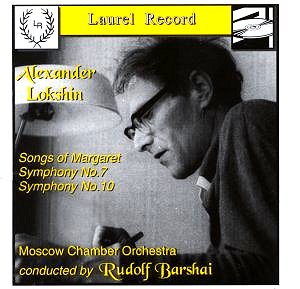Rudolf Barshai has a special and mutually beneficent
relationship with Herschel Burke Gillbert's Laurel Record company. Barshai
collectors need to search out not only Barshai's Melodiya and EMI Classics
discs but also Laurel's Brahms symphonies (2 and 4) and his Mozart and
Rachmaninov.
It was Barshai who formed the Moscow Chamber Orchestra
and with them premiered Lokshin's Symphonies, 4, 5, 7, 9 and 10 as well
as the Songs of Margaret. Tragically Lokshin, who never trimmed
his sail to match the Soviet westerlies, died virtually forgotten in
his native USSR.
The Songs of Margaret are related to
the Trois Scènes du Faust de Goethe on BIS-CD-1156, a
work of 37 minutes duration by comparison with the 18 minutes of the
Songs of Margaret. It is written in a caustically romantic style
which I link with a work such as Nicholas Maw's Scenes and Arias.
Imagine a series of five 'mad scenes'. This is Puccini filtered through
Berg and through Shostakovich. There you have a broad approximation
of the style. The singer is called on to vault the skies more than once
(e.g. tr.4 1.09) and this she does consummately. It would have been
far too easy to portray Goethe's Margaret as inhumanly demented but
Lokshin's power also conveys compassion; indeed the cycle ends with
an overpowering sense of tender resolve.
The orchestra sounds bigger and bolder that the chamber
orchestra ‘tag’ lead me to believe and the Kharkiv-born soprano Ludmilla
Sokolenko meets every one of the volcanic challenges of the score with
power and emotional commitment. She has a grand operatic voice captured
unshrinkingly by the Melodiya engineers.
The 1970s must have been a time of giddy cornucopiac
activity for Lokshin. These two symphonies fall, temporally, either
side of the Margaret Songs. The Seventh Symphony is memorable
for its liquid horn solos, unmistakably old-time Russian in the introduction
(tr.8) and in Minamoto Saneaki (tr 12). The trumpet is just as
Slavonically blatant. Though normally sure-footed the engineers just
occasionally miscalculate. Was it really necessary, in The road is
paved with flowers for the engineers to pull back on the recording
levels. The music brilliantly captures the steady descent of the thermometer
towards the chilly end of mortality.
Three years and three symphonies onwards comes the
Tenth Symphony which embraces the words of one poet rather than
the Britten and Shostakovich anthology habit. The Tenth charts a mood
trajectory similar to that of the Seventh curving from a perspective
in which warmth is cooled by thoughts of death to autumn and wintry
bereavement; typically Russian.
The recording quality is cavernous. I note that these
recordings were in the studio within two to five years of the completion
of the compositions.
The words of the three works are printed in translation
in the 28 page insert booklet. They are given in English translations
by Walter Barshai. The sung words (Russian … as you would expect) are
not printed. I rather missed them and certainly it would have been good
to have them in transliteration; indeed this is preferable to giving
the words in Cyrillic (as happened with the recent Chandos set of Prokofiev's
The Story of a Real Man) which is likely to be of little direct
value to English monoglots wanting to follow the contours of the sung
words.
The booklet essays are well written and admirably preoccupied
with facts. The use of a bold font throughout is a minor distraction.
Powerfully intense traversals of a fascination with
death and bereavement. Typically Russian.
Rob Barnett
